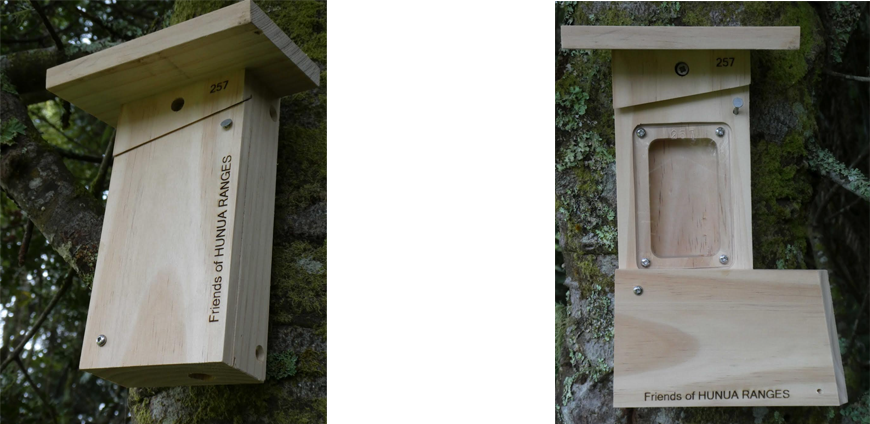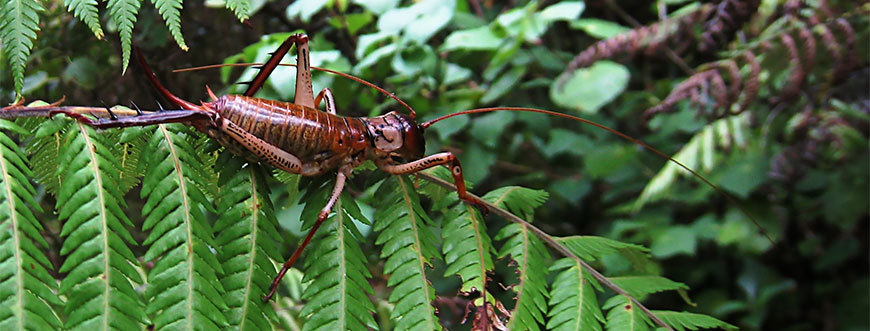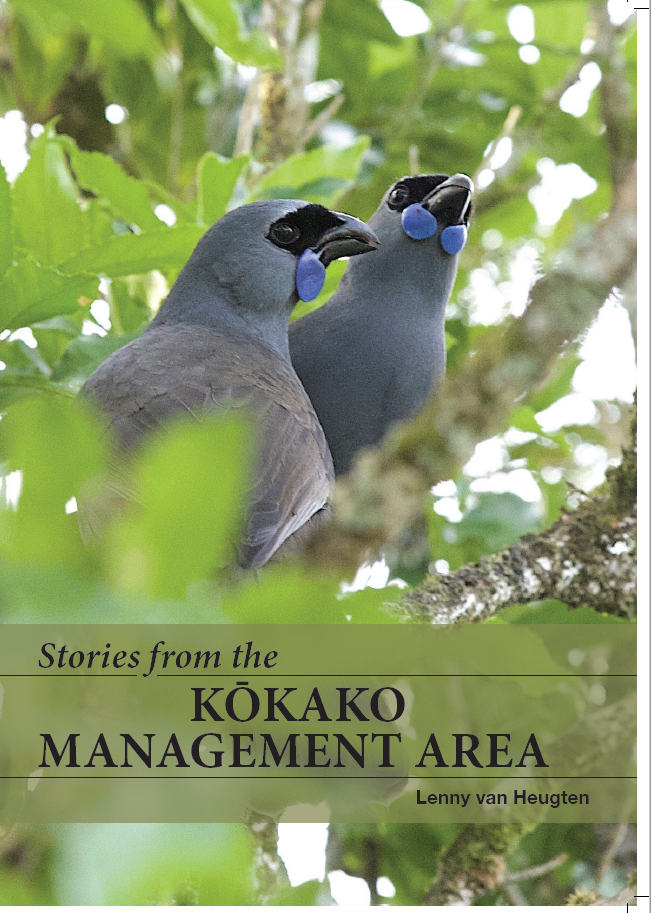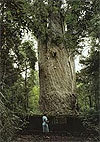Support the weta - order here!
At Friends of Hunua Ranges, we are always looking for opportunties to involve the community in the preservation and recognition of the Ranges' role in hosting and conserving native species. And probably the oldest surviving species in the Hunua Ranges is the Weta.
Due to a range of threats - some due to us humans - the Weta could do with a little hand in staying around for many more centuries to come. One way you can help is by sponsoring the construction of one or more of our Weta Hotels which you can install at home or have us install in the Hunua Ranges.
Expertly constructed by our team of DIY Weta Warriors (FoHR Chairman Merv and Secretary Louis), these Weta Hotels have been designed to provide a nice comfortable home for up to 6 Weta each. If you have even a small grouping of trees at your property, you can order some for there - otherwise you can simply sponsor Weta Hotels for the Weta Warriors to locate in strategic locations within the Hunua Ranges and we'll keep in touch, letting you know how they are going (keep an eye on this page or sign up for our eNewsletter).
We have kept the cost very affordable so we invite you to consider sponsoring one or many - we welcome corporate sponsorship so that we can keep our Warriors busy in their garden sheds building enough Weta Hotels to keep them out of trouble.
On your own property
Should you choose to locate your Weta Hotel on your own property, here are some tips;
Sponsored and located in the Hunua Ranges
Weta Warrior Merv Hood has had a bit of experience with Weta Hotels in the Hunua Ranges and has provided these observations which will help us determine where we will locate sponsored Weta Hotels within the Hunua Ranges, coordinating of course with Park Rangers to ensure the best and safest locations for all;
"New observations from a study where Weta motels have been provided in various locations have uncovered some interesting data.
Where the motels have been located in areas of open country, long grass and the likes there is little or no Weta activity.
Where the motels have been located in mature bush there is also very little Weta activity - this is despite other indicators such as tracking tunnels indicating Weta presence.
The areas where the motels have been located in two to three year old plantings have a very high presence of Weta. In many of the motels they are fully booked!
At this stage it is too early to say if there is a higher number of Wetas present or if it is more related to the provision of suitable habitat and the lack of other places for Weta to camp up. Either way it shows that we can have an impact of the distribution of this interesting creature, possibly speeding up the Bio diversity spread. Further monitoring will be undertaken as the program led by Friend of Hunua Ranges installs more of these Weta motels.
Any member of the public who may wish to can assist either by purchasing one or more motels for installation in the parkland or for their own property or maybe someone who has done any reveg planting or who backs up onto some bush may find it an interesting and rewarding idea. Details on just how you might get involved coming soon."

Wētā have been around long enough to see dinosaurs come and go and to evolve into more than 70 different species, all of them endemic to New Zealand.
Wētā are incredible looking creatures. They range in size, but with their big bodies, spiny legs, and curved tusks, they are one of New Zealand's most recognisable creepy-crawlies.
Wētā have become icons for invertebrate conservation in New Zealand because many species are threatened or endangered. There are more than 70 species of wētā in New Zealand, 16 of which are at risk.
Diet: Wētā are mainly herbivorous in the wild, but are also known to eat insects.
Habitat: They are nocturnal and live in a variety of habitats including grassland, shrub land, forests, and caves. They excavate holes under stones, rotting logs, or in trees, or occupy pre-formed burrows.
Quick Facts
• The weta is only found in New Zealand and is so old it has outlived the dinosaurs.
• Weta are large by insect standards. Some of the giant weta are enormous and are amongst the heaviest insects in the world
• The weta is sometimes called the dinosaur of the insect world
• The weta is more primitive than the tuatara. The weta has changed very little in the past 100 million years.
• Weta have their ears on their front knees and can feel the vibrations of noises around them.
• You can tell a male and female weta apart because females have a long ovipositor, which looks a bit like a stinger, which they use to lay eggs.
There are five different types of weta – tree weta, cave weta, giant weta, tusked weta and ground weta. All together there are over 100 different species of weta.
There are 6 species of tree weta
• The tree weta is sometimes known as the bush weta
• The tree weta is the most common type of weta and usually makes its home in the holes of trees
• The male tree weta is quite aggressive and it will fight another male weta
• It hisses and bites when threatened
• The tree weta has a varied diet and will eat both plants and other insects (this means that it is omnivorous)
• The male weta tends to be quite a hit with the ladies. One male often lives with up to ten females
If you find a weta at home, it will most likely be a tree weta.
Remember to put it somewhere safe after you have looked at it and please don't kill it.
The male tree weta bite can be a little painful - but there is no reason to be afraid of it, especially if you compare it to the size of humans!


Read the remarkable story of the recovery of a very special, at-risk native bird, the North Island kōkako.
Author Lenny van Heugten, an enthusiastic environmentalist working in the South Auckland and North Waikato regions, brings to life this remarkable story.

If you would like to be informed of activities, volunteer opportunities and general news about the Hunua Ranges, then subscribe to our eNewsletter...
 Departing Ranger for Hunua Rangers Scott Kusabs joins us to reflect on his 13+ years at the job...
Departing Ranger for Hunua Rangers Scott Kusabs joins us to reflect on his 13+ years at the job...
Higher risk tracks in the Hunua Ranges Regional Park are closed from 1 May 2018.
A number of higher risk tracks in the Hunua Ranges Regional Park are closed. A Controlled Area Notice (CAN)* is in place across the forested areas of the Hunua Ranges as well as the Waharau Regional Park.
SCRUB | SPRAY | STAY on the track